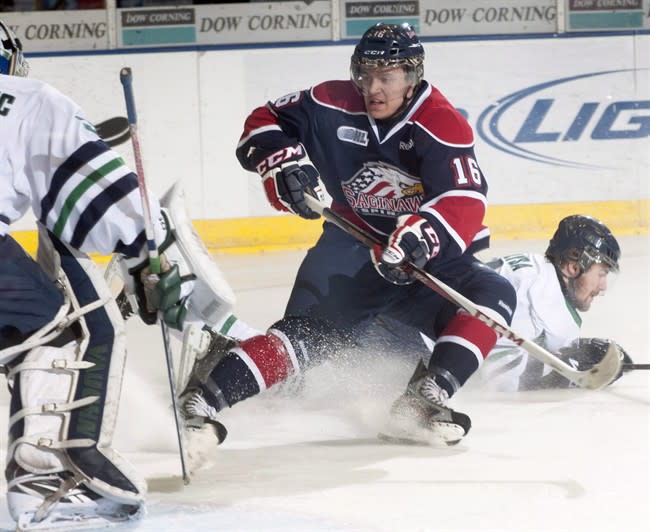OHL touts mental health program, acknowledging 'it's a process' to change attitudes

A mental health support system, whether it's intended for a teenage hockey player, student or someone much older, is only as strong as someone feeling secure in accessing it.
The Ontario Hockey League, as David Branch put it during Monday's teleconference detailing the league's Talk Today mental health initiative, was "changed forever" by the March 2014 suicide of Terry Trafford, who ended his life days after being released by the Saginaw Spirit. The league's partnership with the Canadian Mental Health Association is a direct response to the Trafford tragedy; all 20 teams' personnel will work with a CMHA branch and receive "professional advice as to the signs, the signals" of a mental health crisis. Parents and billet parents are also being encouraged to take part.
The big question is whether young players in a results-based business such as the OHL will feel safe about speaking up. A stigma still surrounds mental illness, more so than a physical ailment.
"In hockey, there's this real macho attitude, that you've got to be tough and be tough at all costs," Branch said on Monday. "We've got to work through this program — and others — to hopefully dispel that. We're dealing with young people. They have needs. We've certainly been talking to all our teams. And I'm comfortable that our teams are understanding the importance and the need to be sensitive to what their players need.
"Hey, it's a process," Branch added. "It's a tremendous step. And I think it will allow us, our league, to put a program in place that will serve the best interests of our players."
All 20 teams will have a seminar for players, coaches and staff with an area CMHA branch "the sooner, the better," as Branch put it. The CMHA will also appoint a mental health coach for each team, while each team in turn will appoint a mental health champion.
Each team will also host a Talk Today event. Engaging parents, and billet parents, is another important component.
"We are taking it a fair bit further with parents," said Camille Quenneville, CEO of the CMHA's Ontario division. "We are encouraging them and providing them the ability to participate in the ASIST [Applied Suicide Intervention Skills Training] training. We are hoping we can get a lot of participation from parents in this training to raise their awareness so that all of the young players have not only parents, but the parents who billet them having taken the training so everyone is very aware of any potential issues around their mental health.
Quenneville added that the CMHA will "leave it to the teams to make those decisions" regarding appointing a mental health 'champion' to advocate for players.
Major junior players, who are aged 16 through 20, face unique circumstances. The cost of being competitive in minor hockey in Canada has escalated, while the competition to be one of the privileged few who goes on to a sustained NHL career is also as intense as ever. All of that can be internalized by a young athlete who is conditioned to trying to please authority figures.
"They have a lot of pressure," Quenneville said of OHL players. "Most of them are living away from home at what I would consider is a very young age. Their schooling is not always done in a typical matter. Their circumstances are very different."
There is evidence that attitudes are changing to reflect the challenges that lifestyle imposes. Last season, the Peterborough Petes, under the guidance of board of directors member Dave Pogue, had 24 players and coaches take part in a program called safe TALK ("Every one of them, to a man, took it seriously," Pogue said on Monday).
Branch said that in June, the OHL had 22-year-old former player Gregg Sutch (a Buzzing The Net contributor) moderate a focus group with graduating overage players. One theme shone through.
"The number one point of recommendation was that the league put into place a mental health program for those young players," Branch said. "It certainly reinforced the program that we were in the midst of putting together."
Ultimately, however, the OHL is still about results. While no one can know exactly what Trafford's final thoughts were, his death was preceded by his late-season dismissal from the Spirit. Branch didn't get into specifics, but said the league will act with more consideration for released and/or traded players.
"They have been adopted unanimously by our teams and we're confident that the necessary safety nets and considerations are in place," Branch said.
Neate Sager is a writer for Yahoo! Canada Sports. Follow him on Twitter @neatebuzzthenet.

 Yahoo Sports
Yahoo Sports 

